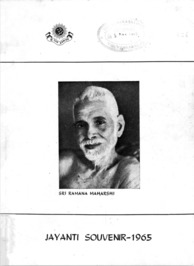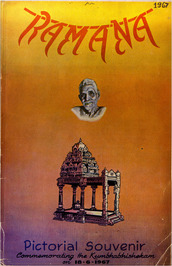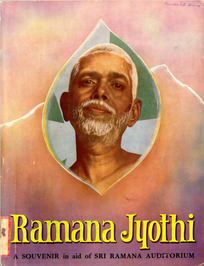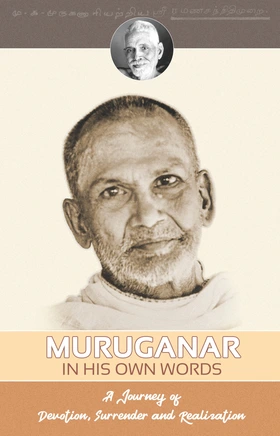Arunachala eLibrary
Alphabetical List of all items
Ancient Texts

Advaita Bodha Deepika, The Lamp of Non-Dual Knowledge
"Originally Sri Shankaracharya and other great Sages had written several commentaries on the Vedanta Sutras. From these, Sri Karapatra Swami condensed the salient points into twelve chapters of Sanskrit verse. Those chapters were later translated into Tamiḷ. This translation into English of the first eight chapters by
Munagala Venkataramaiah (the recorder of "Talks with Sri Ramana Maharshi") was thoroughly revised in the presence of the Maharshi.
pp.110
![]()

All is One
This work, titled
Ellam Ondre, was originally written by an unknown 19th Century author in Tamiḷ. First translated into English in 1951, this carefully revised edition was one of the favorite small Advaitic Tamiḷ texts often recommended by Sri Ramana Maharshi.
Annamalai Swami has said that the Maharshi "laid particular stress on
Ellam Ondre, telling me, 'If you want moksha, write, read and practise the instructions in
Ellam Ondre.'"
pp.72
text

Ashtavakra Gita
This book contains a Kannada transliteration and a lucid English translation by Swami Nityaswarupananda of the Ramakrishna Order and published by the
Maharaja of Mysore. It was presented to the Maharshi in 1932. He then meticulously wrote with his own hand all the sanskrit verses above each Kannada verse. It is
Ashtavakra's teachings to King Janaka. A beautifully printed facsimile reproduction from Sri Ramanasramam's archives.
pp.298
citations
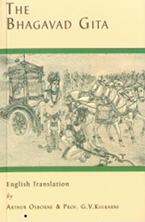
Bhagavad Gita
This is an English translation of the Bhagavad Gita by Arthur Osborne and G.V.Kulkarni. The contents of this book were first published serially in The Mountain Path (the quarterly journal from Sri Ramanasramam) from April 1965 to October 1969. They were later published in book form by the Ashram in June 1973. In this second edition, the Sanskrit text and an English transliteration have been included with the English translation.
Also included are two new appendices. The first is the Bhagavad Gita Saram, the 42 verses selected by Bhagavan which reveal the essence of the Gita. The second is a facsimile of the typed pages of Alan Chadwick's (Sadhu Arunachala) translation of the Gita Saram together with Sri Bhagavan's handwritten corrections.
Bhagavan would often quote verses from the Bhagavad Gita [see
Song Celstial] and comment on their meaning when speaking to devotees. For spiritual seekers the present English translation is a wonderful resource.
pp.338
parayanam

The Essence of the Ribhu Gita
Translated by Professor N.R. Krishnamoorthi Aiyer. The esteemed translator, a retired physics professor was encouraged by the Maharshi to study this text. The one hundred and twenty-one verses selected for this book are mostly those that the Maharshi made familiar to the devotees. They have been rendered into English with a trained accuracy and deep spiritual insight.
pp.24

Jewel Garland of Enquiry
This is an English translation of Vichara Mani Malai, which is a compilation by Sri Bhagavan of salient points from the Tamiḷ version of Vichara Sagara. Vichara Sagara is a voluminous work originally written in Hindi by Sadhu Nischaldas.
pp.22

Kaivalya Navaneeta, The Cream of Emancipation
An English translation by Munagala Venkataramiah of this classical Tamiḷ work on Advaita philosophy. The Maharshi regularly referred to this book and encouraged devotees to study it.
Tandavaraya Swami, the author of the Kaivalya Navaneeta says that he has extracted the
butter
from the
milk.
Those who have obtained this (being fed on the butter of divine wisdom — Brahma jnana — and being eternally satisfied) will not roam about feeding on dust (non-real objects of sense).
pp.74

Ozhivil Odukkam
Like the Upadesha Undiyar and Ulladu Narpadu of Sri Ramana Maharshi, Ozhivil Odukkam is one of those rare books that challenges the reader to leave the comfort zone of the ego-based mind and intellect and seek the truth of his or her own being in the non-dual realm of pure awareness. As such, Ozhivil Odukkam was an essential book in Sri Ramana’s couch-side revolving book case and he frequently quoted from it. Though superficially couched in the terminology of Saiva Siddhanta, it reveals along the way how, in the final analysis, all doctrinal differences of whatever nature cease to exist, upon the death of the ego-mind.
Ramanasramam welcomes the opportunity to publish this important work for the first time in the English language for the benefit of all seekers on the spiritual path.
pp.???

Periya Purāṇam
The
Periya Purānam is the song describing the lives of sixty-three Saivite saints of the ancient Tamiḷ land, sung by a poet-saint himself. In the source biography of Bhagavan,
"Self-Realization, we read: "Towards the end of 1895 (perhaps a few months after hearing about Arunachala from a relation) he found at home a copy of the
Periya Purānam and was awe struck by the life of these remarkable saints." Throughout his life he never tired of telling the stories that he first read as a boy in Madurai.
pp.358
excerpts
Ribhu Gita, The Sixth Amsa of Siva Rahasyam
The first complete Edition, with English Translation, Transliteration and original Sanskrit Text.
In the 50 chapters of the Ribhu Gita, the full spectrum of spiritual knowledge is imparted – this Gita describes the direct experience of the Self and its means of attainment. Though the Truth cannot be described in words, words can guide the ripe aspirant to the direct experience of Truth by the total absorption in the Self. That is the sole theme of this comprehensive scripture.
There is no greater testimony to the unique value of the Ribhu Gita than the fact that Bhagavan Ramana himself told one of his devotees: "It does not matter if you do not understand the text. Read through it anyhow. It will be of immense benefit to you." He also has said that the recitation of the Ribhu Gita is as good as samadhi itself, and he took part in reciting it with his devotees.
MP3 CD: Along with this book you will receive an 11-hour audio recording of all the Sanskrit verses, beautifully rendered by Dr. Lingeswara Rao.
pp.738, (12hr MP3 CD)
read more

Sivabhakta Vilasam
Sri Bhagavan had scanned through the various versions of
Peria Purāṇam in Sanskrit to delineate all those incidents connected with the
Nayanmars (devotees of Siva) that are not found in the Tamiḷ text. When he narrated these stories in his own inimitable style, the spellbound audience would be transported to the actual scenes of those events. These stories were little known then, yet they carry a profound significance by being closely related to his own birthplace and the course of his own spiritual journey.
pp.459
 Song Celestial
Song Celestial
The quintessence of the Bhagavad Gita in forty two verses, selected and arranged by Sri Ramana Maharshi at the request of his devotees, with an English translation and explanatory notes added.
pp.78 Sorupa Saram
Sorupa Saram
Sorupananda (Swarupananda in Sanskrit) lived in South India about 500 years ago. He had the rare power to silence the minds of even sceptical visitors.
Ramana Maharshi frequently told the story of how Sorupananda had effortlessly immersed a group of critical pandits in the silence of the Self for three days.
Sorupananda's only known work Sorupa Saram is an uncompromising exposition on the state of liberated beings who abide in and as the Self.
This new edition of Sorupa Saram contains both the original Tamiḷ text and English translation.
pp.76
![]()

Sri Devikalottara
One of the Upa-agamas highly valued by the Maharshi, so much so that he spontaneously translated it into Tamiḷ verse during his stay in the Virupaksha Cave. It contains Lord Shiva's instruction to Parvati, outlining the direct Advaita path to liberation. This edition contains the Maharshi's Tamiḷ verses, original Sanskrit text with English transliteration and English translation.
pp.91
text

Srimad Bhagavata
Condensed by
S.S. Cohen. Sri Ramana Maharshi often quoted from the teachings and stories found in this classic of Indian spiritual literature. The author skillfully weaves together the most pertinent stories that extol the highest teaching, providing sound guidance and inspiration to seekers of Truth.
pp.316

Tripura Rahasya, The Mystery Beyond The Trinity
An English translation by
Munagala Venkataramiah of this ancient Sanskrit work on Advaita philosophy. The Maharshi considered this to be one of the greatest works expounding the traditional teachings of Advaita and often quoted the verses which are full of divine nectar. This work will quench the thirst of any earnest seeker who repeatedly reflects on its meaning and attempts to apply the teaching.
pp.306

The Vedaparayana
Twice daily, in front of the Maharshi,
the Vedas were recited.
Since the Maharshi often spoke highly about the value of listening to these chants, it continues today at his tomb in
Sri Ramanasramam.
In this book we find the English translations of the various scriptures that are recited daily.
pp.75
read more
citations

Yoga Vasiṣṭha Sara
An English translation, based on a version made by Swami Sureshananda, an old devotee of Bhagavan, of two hundred and thirty verses from the Yoga Vasiṣṭha, broken up into ten chapters.
Bhagavan Sri Ramana Maharshi used to refer to
Yoga Vasiṣṭha frequently and incorporated six couplets from it in His Supplement to
Forty Verses (verses 21 to 27).
pp.29
[ text]
Biographies
view these items in our on-line bookstore
Alagammal's Journey - A Sadhana Katha
Once again, one hundred years ago,
In this book, the story of
Alagammal’s spiritual journey has been told for the first time in the form of a narrative, a katha. The facts and dates are historical. The portrayal of her life’s journey is the humble attempt of the author to depict the pain and struggle of a young mother and widow whose destiny it was to lose much on the human level and yet to gain the ultimate release from the cycle of birth and death. This is the story of the journey of a soul from individual to universal motherhood.
Sri Ramanasramam is very happy to commemorate this historical event with the publication of
Alagammal’s Journey, A Sadhana Katha
.
pp.92

Bhagavan and Nayana
Vasiṣṭha Ganapati Muni was a mighty spiritual personality. He came upon one greater, Sri Ramana Maharshi, and surrendered to him without reserve. This book chronicles the amazing details of the relationship between these two great spiritual personalities. It also provides a complete account of the great Muni's inspired Sanskrit compositions.
pp.155
excerpt

Bhagavan Ramana
A well composed sketch of Sri Ramana Maharshi's life, reprinted from the introduction to
Ramana Maharshi and His Philosophy of Existence. This small book is an excellent short introduction to the life of Sri Maharshi.
pp.25
Extracts
Full Text
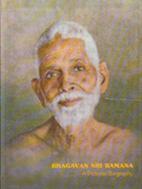
Bhagavan Sri Ramana – A Pictorial Biography
The incomparable life of the Sage by Joan and Matthew Greenblatt is chronologically unfolded with over 200 illustrations and many quotations from the Maharshi and his devotees. Printed on art paper, extensively researched and produced with full attention to detail and quality, this is the very best pictorial book published by Sri Ramanasramam.
pp.112
citations
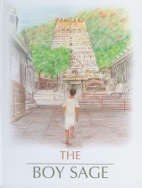
The Boy Sage
This beautifully illustrated children’s storybook tells the life of Sri Ramana Maharshi, highlighting his childhood experiences and the endearing relationship he had with children and animals.
pp.42 (art stock), hardbound, 8 3/4" x 11 1/4"
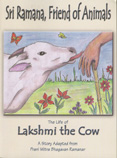
Life of the Cow Lakshmi, The
Many imagine that Moksha occurs only in humans, but in June 1948 Bhagavan Sri Ramana Maharshi declared that cow Lakshmi attained liberation. Her complete story is told in a child-friendly manner through a series of engaging dialogues. The book is profusely illustrated with colored drawings, and photographs.
pp.96

The Mahanirvana of Bhagavan Sri Ramana Maharshi
A small, well written pocket-size booklet with four photographs that paints a moving picture of the final days of the Maharshi's life.
pp.62

The Mighty Mahatma Strides the Land
Born in a remote village of northern India, the author was caught in the current of Mahatma Gandhi's National Movement at a very young age. With a rare zeal, he aspired to imbibe Gandhi's ideals, while struggling to overcome the illiteracy and complacency which had persisted through the centuries. This is the story of Arunachala Bhakta Bhagavat's early youth, told in his own immitable style.
pp.55
![[My Life and Quest cover image] [My Life and Quest cover image]](/images/books/my-laq.jpg)
My Life and Quest
By Arthur Osborne, one of the most ardent and well known of the devotees of Sri Ramana Maharshi. He was the Founder-Editor of The Mountain Path, the spiritual journal published by Sri Ramanasramam. He is also well known as the editor of 'The Collected Works of Ramana Maharshi' and as the author of 'Ramana Maharshi and the Path of Self-Knowledge', and other books.
The candid description of Osborne's personal struggles and his spiritual fulfillment, along with his moving portrayal of the spiritual ministry of Sri Bhagavan, offers a wealth of inspiration. This newest publication of Sri Ramanasramam, Arthur Osborne's autobiography, also contains 47 pages of his poems.
pp.217
Ch.10
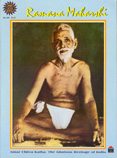 Ramana Maharshi,Amar Chitra Katha (Children)
Ramana Maharshi,Amar Chitra Katha (Children)
Glorious Heritage of India Series. In thirty pages, the life and teachings of Sri Ramana Maharshi is told with colorful illustrations in this popular format. Printed on quality paper, insuring years of reading for children of all ages.
pp.30
 Ramana Maharshi and the Path of Self-Knowledge
Ramana Maharshi and the Path of Self-Knowledge
By Arthur Osborne. A well written and very popular biography which has done much to disseminate a knowledge of Sri Ramana Maharshi, both in India and abroad. Interesting chapters on "Upadesa" (teachings), "The Devotees," "The Mother," and "Continued Presence" contribute to this comprehensive profile of the Sage's unique life. (2000 EDITION)
pp.195
رامانا-ماهارشي-و-درب-معرفة-الذات
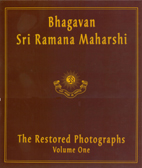
Restored Photos, Vol.1
All of the pictures used in this series of Restored Photographs have been selected for their clarity and definitions. A number of close-ups have also been included. Volume One contains 50 prints, comprising - 18 newly restored photographs with 8 close-ups. 11 previously restored photographs with 3 close-ups. 10 new colour plates. The photographs are a great treasure trove.
pp.??

Self-Realization
By B.V.Narasimha Swami. This is the earliest major biography of Sri Ramana Maharshi, first published in 1931 and now containing
an epilogue by
S.S. Cohen.
pp.279
Excerpt
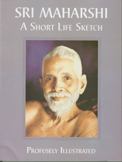
Sri Maharshi - A Short Life-Sketch
By M.S. Kamath. A richly illustrated biography written in simple style.
112 illustrations, 8 x 10, pp.60

Sri Ramana Leela
By Krishna Bhikshu, a fervent lawyer-devotee first published this Telugu biography of Sri Ramana in 1936. This is one of three biographies published during the Maharshi's bodily lifetime. The contents of the book was read and revised before Sri Ramana on at least three occasions, prior to reprinting. Ramana Leela, therefore, is the only biography of Sri Bhagavan that has been so thoroughly scrutinized by the Sage, and hence rings with authenticity. This English translation was first published in 2004.
pp.317
Commentaries on Maharshi's Writings
view these items in our on-line bookstore

Arunachala Aksharamanamalai - Muruganar
Muruganar was a devotee who had the opportunity to be closely associated with Bhagavan for decades. In accordance with what he had learned through questioning Bhagavan, he wrote this excellent vritti urai (detailed commentary) on Aksharamanamalai acceding to the repeated requests of devotees of Bhagavan.
The Ashram wished to unlock the arcane secrets of
Sri Muruganar’s
Tamiḷ commentary and bring out a lucid and accurate English translation for the benefit of English speaking devotees. Readers of this commentary will agree that Robert Butler has recreated the awesome spiritual presence of Sri Arunachala Ramana by the power of his pen aided by the Grace of Sri Ramana Maharshi.
pp.269

Arunachala Pancharatna Varttikam
This commentary on Bhagavan's five verses was written by the author ('WHO', K. Lakshmana Sarma)
during Sri Bhagavan's time and was reviewed by him. For the first time, these 108 verses are now available in Sanskrit together with Roman transliteration followed by English and Tamiḷ translations. Includes Sri Bhagavan's own handwriting.
pp.78, 1st Ed, 2006
text

Cardinal Teaching of the Maharshi, Arunachala Pancharatna Darpanam
An English translation by S. Shankaranarayanan of
Kapali Śāstṛi's
Sanskrit commentary on the Maharshi's
Arunachala Pancharatna
(Five verses to Arunachala)
[ rel="nofollow" href="/docs/collected-worm/pancaratnam/tamil">tamiḷ]
pp.13

Epistles of Light
Sanskrit letters written by Vasiṣṭha Ganapathi Muni to Sri Ramana Maharshi in the year 1931. The book contains the Sanskrit text followed by the English translation. These letters were read and preserved with veneration by the Maharshi.
"Giver of everything desirable! Though I may be having a thousand desires, they are all set at rest within the cave of Heart scorched by the effulgence of Your benevolent look. Only one of them sprouts forth raising its head even now. May my impure Ego perish! My Lord, grant me the fulfilment of this aspiration." from a letter by
Ganapathi Muni
to Maharshi Ramana (March 31, 1931) Each letter in Sanskrit text is followed by the English translation.
pp.52
![For Those With Little Dust [jpg]
click to see a larger image For Those With Little Dust [jpg]](/images/books/sm/for-twld.jpg)
For Those With Little Dust, Selected Writings of Arthur Osborne
Arthur Osborne
was a rare individual whose exceptionally keen intellect, intense introspection, and poetic spirit were wonderfully integrated. A graduate of Oxford and a lover of learning, he was prepared for what would doubtless have been a brilliant career in teaching. Yet he was compelled to follow his inner longing to experience the Supreme Reality. This longing brought him to the Indian sage Sri Ramana Maharshi.
Osborne dedicated himself to sharing his insight and depth of experience with seekers on the path. These editorials, articles and poems bridge an expanse of spiritual topics which are uplifting and enlightening. Seekers of Truth from all faiths and paths will find this collection a treasure-house of practical wisdom and guidance.
pp.318
![Forty Verses on Reality [jpg]](/images/books/forty-vor.jpg)
Forty Verses on Reality
S.S. Cohen
utilizes all his innate writing skills to render the Maharshi's
Ulladu Narpadu
into an easily-understandable, conversational-style translation. In these verses all the salient points of the Maharshi's teachings are touched, with emphasis on the central practice of
Self-Enquiry.
The translator's perspicacious notes follow each verse.
pp.46
Ulladu Narpadu

Quintessence of Wisdom
Translation and Commentary by M. Anantanarayanan. Contains a summary of Sri Ramana's life written in original prose, a thorough introduction, providing a comprehensive rendering of the Maharshi's teachings and a verse by verse translation and commentary of the Sage's most well-known treatise,
"Upadesh Undiyar,"
or
"Upadesa Saram."
pp.49

Reality in Forty Verses with supplement
“Everyone is saying that Lakshmana Sarma’s commentary on Ulladu Narpadu is the best. Nobody has studied Ulladu Narpadu the way Sarma has.” This pregnant remark from the Master himself speaks volumes about the value of this work. Sri Sarma’s initial hesitation to study this text on the plea of his unfamiliarity with classical Tamiḷ was instantly overcome when the Maharshi himself offered to tutor him privately. And this enlightening edification went on for three long years. The repository of solid wisdom chose to flow in rich rivulets of illuminating and nectarine exposition. Sri Sarma meticulously compacted them in a commentary that was first published in 1936.
This treasure-trove thus far available to the Tamiḷ-knowing public is now thrown open for the first time to english-speaking devotees.
pp.243, 13 oz.

Reflections on Talks with Sri Ramana Maharshi
By S.S. Cohen.
Contains detailed notes on special passages from
Talks with Sri Ramana Maharshi, arranged by subject into fourteen chapters, and presented with the insight of one who sat at the feet of the Master and applied his teachings whole-heartedly.
pp.189

Sri Ramana Darsanam
By Sadhu Natanananda.
This book is divided into ten scenes describing each aspect of Truth and the qualities of a Jnani. The book also includes previously unpublished poems that give a rare glimpse into the inner experiences that came to
Sadhu Natanananda
as a direct result of Bhagavan's teachings and grace.
pp.146

Sri Ramana Dhyanam
A small, pocket-size book containing twenty-four stotra-like verses in English, and composed by
N.N. Rajan
in praise of Sri Ramana.
pp.38
Excerpt
![]() español
español

Sri Maharshi's Way (Upadesa Saram)
This treasury of instruction and guidance manages to summarize, explain and integrate the great teraditional margas, or paths, of Hindu religious discipline and then to show the unique way to human freedom, which Ramana himself offered to contemporary humankind. Karma, Bhakti, Raja and Jnana yogas are each suited to a different type of individual or to a different stage of a person's spiritual development. D.M. Śāstṛi has given us short and very readable explanations of this supreme legacy of Ramana Maharshi.
pp.56

Technique of Maha Yoga
By N.R. Narayana Aiyer. This slim book is indeed a gem, a boon for those practicing self-enquiry as taught by Sri Ramana Maharshi. Written in 1962 by a devotee who was for many years in the Presence of Sri Maharshi and earnestly practiced his teaching, this book, a first-class seeker's manual, anticipates every question that is apt to arise in the mind of the practicant and answers them all in Sri Maharshi's own words, mostly culled from
Talks with Sri Ramana Maharshi.
This book is
back in print
after many years.
pp.77

Uniqueness of Sri Bhagavan
All of the contents of this book have direct relevance for the practical application Sri Ramana Maharshi's teachings in today's busy world. These writings are the fruit of a lifetime of association with and dedication to Bhagavan Ramana, offered by the author to all earnest seekers of peace and perfection.
K.Subrahmanian establishes the uniqueness of Sri Bhagavan and his teachings in a beautiful, simple and effective style, under chapter titles such as: Silence, Self-enquiry, Freedom, Sadguru, Tension-free Life, Meditation, Happiness, Surrender, Grace, Compassion, Suffering, Motiveless Bhakti, Flood of Love, and Sadhana.
pp.88
excerpt
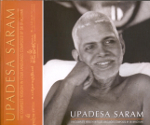
Upadesa Saram, The Complete Version in Four languages
Bhagavan Sri Ramana Maharshi composed
Upadesa Saram
in Tamiḷ and later rendered it into three other languages – Sanskrit, Telugu, and
Malayalam. This publications includes all four languages with transliteration, word for word meaning, paraphrase and commentary.
pp.243, 1st Ed, 2010
Compilations and Expositions
view these items in our on-line bookstore
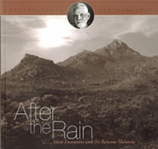
After the Rain
Today, not having the benefit of Bhagavan's physical presence, we find ourselves turning to his recorded works and images for our ongoing darshan. Indeed, contemplating a photo or rereading Bhagavan's timeless utterances provides inspiration and guidance for all who would seek him.
The present edition is a spiritual excursion into the heart of Bhagavan's teaching. A companion volume to the ever-popular "Heart is Thy Name", this collection seeks to pay tribute to the aesthetic virtues of its predecessor.
This collection picks up were the previous ones left off and offers fresh glimpses of the Maharshi and the Ashram environs, garlanding them with penetrating selections from "Talks" and other works of Sri Bhagavan. As with the earlier collections, the citations in this volume have been freely adapted without the burden of editorial commentary in order to facilitate a more meditative reading.
pp.108, (art stock) 9"x 9"

Erase the Ego
Compiled by Swami Rajeswarananda. This small book published by Bharatiya Vidya Bhavan contains an integral compilation of the Maharshi's teachings in a lucid essay form, ending with a dialogue of questions and answers.
pp.55

Gems from Bhagavan
An extremely useful collection of the Maharshi's teachings, compiled and edited by A. Devaraja Mudaliar, and broken into thirteen subject-chapters with such titles as "Heart," "Grace and Guru," "Fate and Free Will" and "Mind"; all of them incorporating the salient teachings of the Sage.
pp.58
![]() Extracts
Extracts
![]()

Guru-Ramana-Vachana-Mala
By 'Who' (K.Lakshmana Sarma). An English rendering with explanatory notes of 350 Sanskrit verses embodying the oral teachings of Sri Bhagavan. About 300 of the verses are originally from Sri Muruganar's Guru Vachaka Kovai
(The Garland of Guru's Sayings).
pp.70
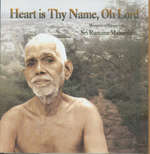
Heart Is Thy Name, Oh Lord
Definitely the most attractive book ever published by Sri Ramanasramam. In "Heart is Thy Name, Oh Lord", Bharati Mirchandani has exquisitely harmonized two incomparable aspects of Sri Ramana Maharshi -- his simple, direct teachings and His Divine Presence.
This subtle art of weaving together photos and quotations in a complimentary manner delightfully brings home the Master's unique personality and message.
pp.108 (art stock) 9" x 9.5"
Maha Yoga of Bhagavan Sri Ramana
By 'Who' (K.Lakshmana Sarma). This profound exposition of Sri Ramana Maharshi's teachings is the result of an intimate association with the Sage for more than twenty years. The author spent two or three years translating to Sanskrit some of the Maharshi's Tamiḷ works, and during this period he received long and pertinent instructions on all aspects of the Maharshi's practical philosophy. This book is the most thorough and intriguing study of his teachings, providing a firm theoretical foundation on which to understand their practical application. (2000 Edition)
pp.196

Teachings of Sri Ramana Maharshi in His Own Words
Edited by Arthur Osborne. This is a comprehensive selection of dialogues with Sri Ramana Maharshi, with brief, insightful explanatory notes that clarify and simplify the practical application of his teachings.
pp.256

Thus Spake Ramana
Edited by Swami Rajeswarananda. A pocket-size book containing 125 passages selected from Sri Ramana Maharshi's teachings.
pp.120
Miscellaneous Books
view these items in our on-line bookstore

108 Names of Sri Bhagavan, Ramana Ashtottara
By
Sri Viswanatha Swami. Translation and commentary by
Prof.K.Swaminathan. These
108 Names of Ramana in Sanskrit (Ramana Ashtothara) are daily recited with archana before the tomb of the Maharshi. Its daily recitation is a sadhana for many of Sri Bhagavan's devotees. This book contains the Sanskrit text, the English transliteration and an English commentary for each Name.
pp.47
text

Advaitic Sadhana
By S.S.Cohen a direct disciple of Bhagavan Sri Ramana Maharshi. This book is a small trilogy on the science of Self-knowledge, a science which has been from time immemorial inculcated in this country by the great Vedantic Masters to those who sat at their feet, seeking release from the misery of birth and death and succeeded.
The trilogy consists of (1) Advaitic Sadhana or the Yoga of Direct Liberation, which throws much light on the practice of sadhana, especially meditation, (2) the well known
Mandukya Upanishad with brief notes and (3)
Atma Bodha of Sankara, the greatest exponent of the Upanishads, with simple comments, in simple language, comprehensible even to foreign beginners.
pp.104
text

Aruna of the Golden Fire
Arunachala is immortal light – A column of fire that existed before time began. The light shone so that all those lost in worldly forgetfulness might remember their true home.
The present edition blends images of the Holy Hill, Guru Ramana, Arunachala Temple and
Sri Ramanasramam,
with the sayings of the saints and scriptures including Bhagavan's own verses written in praise of the Mountain. In essence this book probes the question, what is Arunachala if not one's own Self? Every page contains a beautiful photograph and quotation.
pp.108

Arunachala Siva
By Dr. T. M. P. Mahadevan. This newly reprinted book contains transliterations and translations of two of Sri Ramana Maharshi's Five Hymns to Sri Arunachala: "Aksharamanamalai" (Marital Garland of Letters) and his Sanskrit "Arunachala Pancaratnam" (Five Gems on Sri Arunachala). Each verse is followed by an English translation and further illuminated by short, insightful commentaries. This book, long out of print, is a valuable addition to the literature published by
Sri Ramanasramam, India.
pp.125

Atma Sakshatkara Prakaranam
Translated by
Sri Muruganar and Dr.H.Ramamurthy. These verses are from the Sanskrit Saiva Agamas where Iswara (Siva) imparts spriritual instruction to Guha. Sri Bhagavan rendered this prakaranam into Tamiḷ verse a few years after his similar versification of Devikalotara during his Virupaksha days. Sri Ramanasramam has now published this with the original sanskrit, a transliteration and the english meaning.
pp.72
![]()

Be Still, It is the Wind That Sings
The
Arthur Osborne's thorough understanding of the Maharshi's teachings are the product of a mind illumined by spiritual experience. His language is robust; his knowledge of spirituality pervasive. This was most evident in his editorship of
The Mountain Path magazine.
When articles on various required spiritual topics were not forthcoming, Mr.Osborne would write them himself with remarkable clarity and insight under several pseudonyms. This comprehensive collection of articles and 16 previously unpublished poems is a tribute to the author's stature as a writer and to his illustrious spiritual journey.
pp.475

Bhagavan Ramana, Friend of All
This is a compilation of all recorded incidents that show Bhagavan Ramana's unique relationships with all living beings. He knew no duality and bestowed his Grace equally on all life forms. His compassion for souls inhabiting bodies other than human is awe inspiring and many such evolved souls were spiritually uplifted and liberated by their association with Guru Ramana.
pp.288

The Bloom of Inner Glory
In this book by
N.N. Rajan we find a summary of the Maharshi's teachings, an explanation of his role as the Guru, the method of practice and other similar topics, all strung together in a precise treatise, written out of the fullness of the author's devotion.
pp.107

Buddhism and Christianity in the Light of Hinduism
Arthur Osborne has in this deceptively simple but profound exposition highlighted the essential unity of Buddhism and Christianity. Each one broke away from the parent religion to fulfill the needs of the times in which they were born. As time passed the original beliefs became obscure and the surrounding structure acquired more importance. But Hinduism, if properly understood, is an umbrella that covers all formulae for worship, and the core truth of all religions leads to the same goal. Religion is what mankind creates. Advaita is what we truly are
pp.186

Book of Daily Worship, Sri Ramana Ashtottara
English transliteration, word for word meaning, and Sanskrit text of the 108 names of Sri Ramana Maharshi, composed by his disciple,
Swami Viswanathan. Puja is daily performed at the tomb of the Sage using this ashtottara.
pp.114
read more

Collected Works of Ganapati Muni
Vasiṣṭha Kavyakantha Sri Ganapati Sastry (1878-1936)
Sri Ganapati Sastry was born in Kalavarayi near Bobbili in Andhra Pradesh on 17 November 1878. His parents were Sri Narasimha Sastry and Srimati Narasamamba. Born as an amsa (portion) of Lord Ganesaha, he was gifted with marvellous powers of mind, intellect and soul. His entire life was a "tapasya", a quest for the Eternal. He was endowed with extra-ordinary capacity to compose Sanskrit verses extempore. He was adorned with the title "Kavyakantha" (Voice-of-poetry) at the early age of 22. His indubitable versatile genius, keenness of perception, powers of intellect and intuition made him the most prolific Sanskrit writer of the 20th century. His Sanskrit compositions cover a wide variety of topics: praises and prayers to various deities (strotras), poetic compositions (kāvyas) philosophy (darshana), logic [nyāyāshāstra), medical science (āyurveda), astrology and astronomy (jyotishshāshastra), commentaries (bhāshshya), novel (ākhyāyikā), letters (patrāni) and other research works. His wide scholarship and studies in religious lore had harmonized in him all religions and schools of philosophy. Indeed his writings will be a guiding spirit and lamp for centuries to come.
Volumes 1-12, hardcover

Forty Verses in Adoration of Sri Ramana - Sri Ramana Chatvarimśat
This Sanskrit hymn composed by
Kavyakantha Ganapati Muni is recited before the Maharshi's tomb every morning. Each verse is given in Devanagari and transliteration and followed by an English translation and commentary.
pp.68
read more

Fragrant Petals
An exquisite collection of articles culled from various magazines in order to commemorate the 50th Aradhana of Bhagavan Sri Ramana Maharshi. As we turn the pages of this anthology, we feel we are back in those times and we experience the same peace and tranquility which these devotess felt in His presence.
pp.173
read more

Garland of Guru's Sayings, Guru Vachaka Kovai
Translated from the Tamiḷ by
Prof.K.Swaminathan.
Muruganar was the inspired poet laureate of Ramanasramam and his poetry in this book embodies the most precise, systematic and authoritative exposition of his Master's teachings. The Maharshi read and approved the verses in this book and even added twenty-eight of his own. Each verse represents a finely polished pearl that fell from the Maharshi's lips. The extensive Index and Table of Contents enhances its use as a practical reference to the Maharshi's teachings.
pp.252
Table of Contents,
some verses

Glory of Arunachala
This translation of the Arunachala Mahatmyam from Tamiḷ by M. C. Subramanian was originally serialized in 'The Mountain Path'. This book also includes some vignettes translated by Sri J. Jayaraman from the Tamiḷ
'Arunachala Purāṇam', a poetic work by Saiva Ellapa Navalar which the Maharshi often mentioned.
pp.248

Golden Jubilee Souvenir[1]
The written testimonies to Sri Ramana Maharshi from many of the prominent personalities who made their way to the Maharshi during the first half of the 20th century. A classic treasure commemorating the Sage's 50th year at Sri Arunachala.
pp.494
citations

A Guide to Giripradakshina
This is a practical, handy guide to use while walking around the holy Arunachala Mountain. Whether taking the inner-forest route or the main road, this book will guide you, pointing out all the important shrines and landmarks as you go. Numerous photos, both color and black and white, are provided, along with a fold-out page that has a satellite view of the hill on one side and a topographical map on the other showing the routes and important shrines.
pp.64
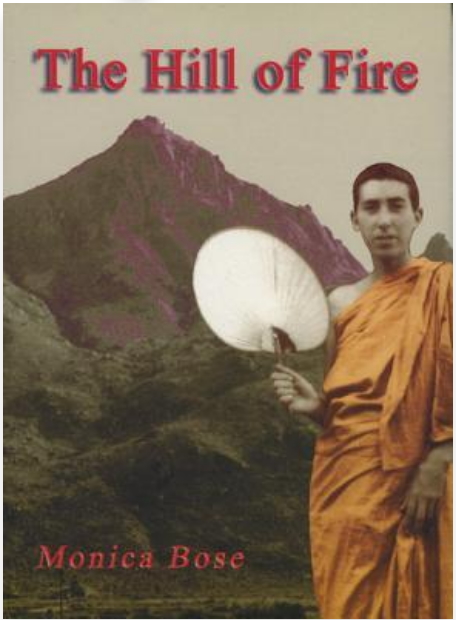
This is Monica Bose's account of the long search for Truth made by her mother, Dr.Suzanne Alexandra Curtil Sen, known in India as Sujata. Although there were severe initial difficulties, it seems that the need to overcome them gave impetus and strength of purpose to Suzanne's endeavour which, in the end, was to lead to far from ordinary achievement.
She had an extraordinary life. She went to the distant lands of India, Ceylon and Tibet to obtain the instructions of the great Masters. She entered fields from which women were usually excluded....
.
pp.103
![]()
![]()

Homage to the Presence of Sri Ramana - Sri Ramana Sannidhi Murai (Garland of Adoration)
This selection of 473 verses of Homage to the Presence written by
Sri Muruganar in adoration of and devotion to his Guru, Sri Ramana has been translated into English by
Prof. K. Swaminathan.
pp.190"
read more

Hunting the "I"
In the auspicious atmosphere of the Holy Arunachala hill things seem to arrange themselves. Thus, it happened that V. Ganesan made a suggestion , the german authoress
Lucy Cornelsson provided the material,
Prof. K. Swaminathan and
Sri Viswanath Swami went over the material and provided suggestions and Jim Grant, a young American devotee, took special care in touching up the final representation. So, this book goes out as a small example of the great truth: "Things happen, men are merely the means to make them happen.
pp.117
table of contents

In Search of Self
Selected writings of
Arunachala Bhakta Bhagawata, the founder of the
New York Arunachala Ashrama. These writings are autobiographical in nature and begin with his early life as a boy in Bihar, India when he was first came under the influence of Mahatma Gandhi. He tells the story of his long life of devotion and struggle. The second part of the book reveals his deep devotion for the
Sage of Arunachala and his resolve to depend solely on him as he serves seekers and devotees through the Arunachala Ashrama. Illustrated,
pp.175
ToC/excerpts

The Maharshi
By
Kapali Śāstṛi. The author was a celebrated disciple of Ganapati Muni. This is a collection of Śāstṛi's diary selections, articles, and translations from Sanskrit compositions, all of which were derived from his association with Ramana Maharshi.
pp.100

"The Mountain Path" Magazine
Arthur Osborne launched this spiritual periodical of Sri Ramanasramam in 1964. It continues today as a potent source of inspiration throuhout the world. The quarterly issues are now available from Arunachala Ashrama New York in limited quantities.
please visit Sri Ramanasramam's Mountain Path page where past issues are available on-lineor this site's Mountain Path page For more information.
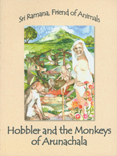
Nondi and the Monkeys of Arunachala
Sri Ramana's intimate association with the monkey tribes on and around Arunachala spanned from the early days of his arrival in Tiruvannamalai to the final days of his bodily existence. He was their friend, protector, arbitrator, guide and gracious benefactor.
This wonderfully illustrated volume weaves together all the fascinating stories handed down to us by devotees and Bhagavan's own narrations. It is a book for children of all ages who are ever charmed by the awe-inspiring episodes in the life of this divine personality, embodied in human form for the welfare of all creatures.
The color illustrations sparkle with life and complement the many black and white restored photos of Bhagavan, Skandasramam and
Sri Ramanasramam. The text is delicately woven throughout the charming images.
pp.108
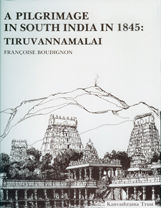
A Pilgrimage in South India in 1845: Tiruvannamalai
In this charming and beautifully-illustrated account, drawn with artistic precision, Francoise Boudignon documents in both art and words a villager's journey to Tiruvannamalai for the annual Karthikai Deepam Festival. He documents the architecture of the town, the main temple, its people, customs and activities - an enchanting historical document of the mid-19th Century.
pp.60

Ramana Arunachala
A collection of essays by
Arthur Osborne on the life and teachings of Sri Ramana Maharshi, written with the insight and clarity unique to the author.
pp.64

Ramana Maharshi and His Philosophy of Existence
Long out of print, 'Ramana Maharshi and His Philosophy of Existence' remains a classic study on the teachings of Sri Ramana Maharshi and its relevance in the world of philosophic thought and spritual experience.
The author, Dr. T. M. P. Mahadevan, was an ardent devotee of the Maharshi and director of the Center of Advanced Study of the University of Madras. His profound spiritual vision and vast philosophical knowledge yields extraordinary insight into th Maharshi's teachings.
pp.137

Ramana's Arunachala – Ocean of Grace Divine
By Bhagavan's Devotees. The first fourteen chapters take us through the origin of the Arunachala Hill, the ancient text written about It, the saints and sages who visited, lived there and sang its praises, the great Temple's history, a description of the path around the Holy Hill, Its mysteries, etc. A fold-out map of the Hill and its sacred places is provided. The second part chronicles the Maharshi's unique relationship with the Holy Hill. The book, produced by an ardent bhakta of Arunachala, is thorough and interesting.
pp.462

Search in Secret India
Paul Brunton describes his arduous search for peace and spirituality in India in 1930. He meets many yogis and saints but in the end finds the inner enlightenment he seeks at the feet of Sri Ramana Maharshi. Translated into many languages in the 1930s, it brought the message of the Maharshi to the world, and then the world came to him.
pp.318
$13.00
see also
Maharshi and His Message

Sri Ramana Stuti Panchakam
An English translation of five Tamiḷ songs composed by Satyamangala Venkatarama Iyer in praise of Sri Ramana Maharshi. This enigmatic devotee visited the Maharshi only once in 1910 and was so transformed that, for five days straight, he ecstatically sang each one of these songs before the Sage. They have become the most popular songs in praise of Ramana in Tamiḷ literature.
pp.16

Spiritual Stories, As Told By Sri Ramana Maharshi
Edited by Joan Greenblatt. A collection of instructive stories narrated by Sri Ramana Maharshi.
pp.134

Sri Ramana - the Sage of Arunagiri
By Aksharajna (G. R. Subbaramayya). First published in 1937, this book contains a bright and robust description of the Sage's boyhood and subsequent life, followed by a comprehensive collection of the Maharshi's teachings culled from the standard sources. The author's genuine enthusiasm endows this book with a special value.
pp.91

Sri Ramana - The Self Supreme
By Prof.K.Swaminathan. The Professor came under the influence the Sri Ramana Maharshi early part of his illustrious career. His insight into the Maharshi is as unequivocal as the language he expresses it in. This collection of sixteen articles illuminates the teachings and the living presence of the Sage.
pp.126
1. Since the 1946 Golden Jubilee Souvenir, the following Sri Ramana Souvenirs have been published:
Records and Dialogues
view these items in our on-line bookstore
Conscious Immortality
This is the fourth revised edition of Conscious Immortality first published in 1983. It is a record of conversations and observations made by Paul Brunton and Munagala S. Venkataramiah, the compiler of Talks with Sri Ramana Maharshi during the second half the 1930s. Just over half the record in Conscious Immortality can also be found in "Talks."
Since Brunton's notebook is a historical document, the ashram has reprinted the notebook adhering as closely as possible to its original format and style. The editing has been minimal.
There is a wealth of instruction in the notebook and the devotees can gain immeasurably from this new edition.
pp.90

Day by Day with Bhagavan
This diary by
A. Devaraja Mudaliar
records conversations and events that took place in the Maharshi's hall during the years 1945 to 1947. The author felt quite free with the Maharshi and discussed all matters with him. Interesting insights into the Sage's personal life, his relations with devotees, habits and interests, along with many unique dialogues relating to sadhana are all recorded in a manner easy to read.
pp.405 (hardcover)
Table of Contents
Extracts (pdf)

Letters from Sri Ramanasramam
By Suri Nagamma. Includes 241 letters from the original Volumes 1 and 2 and incorporates the 31 letters formerly published in 'Letters from and Recollections of Sri Ramanasramam'. These letters, which Suri Nagamma wrote to her brother from Sri Ramanasramami, are translated by D.S.Śāstṛi. The author, who was a beloved devotee of the Master, wonderfully captures the unique personality of the Sage, while graphically recording many incidents in the Old Hall. The Maharshi encouraged her in this writing and specifically related many incidents and teachings to her so they could be recorded.
pp.744
Table of Contents & audio

Maharshi and His Message
By Paul Brunton. A reprint of three chapters from
A Search in Secret India,
the book which first made Sri Ramana Maharshi widely known outside of India.
pp.90
![]()
![]()
![[click to see a larger image] [Maharshi's Gospel cover]](/images/books/sm/maharshis-g.jpg)
Maharshi's Gospel
A collection of Sri Ramana Maharshi's answers to questions that cover a vast range of spiritual topics, arranged and edited by subject into thirteen chapters. This forms a brief but comprehensive record of his oral teachings.
pp.78
Extract,
Frydman,
en español

Maha Tapasvi
This book, written by A.V.Ramanan, details the life story of
Kavyakantha Ganapati Muni.
Quotations from various Vedantic scriptural works and interesting anecdotes are strewn throughout the pages of this book. This great Vedic seer was an extraordinary poet, scholar, and devotee whose monumental works will be remembered throughout the ages. Readers will be immensely benefited by studying the details of this foremost devotee of Bhagavan Sri Ramana Maharshi.
pp.308

Sat-Darshana Bhashya and Talks with Maharshi
Sat Darshana is
Vasistha Ganapati Muni's inspired Sanskrit translation of Sri Ramana's Tamiḷ
"Ulladu Narpadu" (Forty verses on Reality).
Kapali Śāstṛi, a close disciple of the Muni, has elucidated with clarity and profundity the meaning of these verses in his Sanskrit Bhasya (commentary). This book also contains Śāstṛi's recorded conversations with Sri Bhagavan. These "Talks" cover the full range of the Maharshi's teaching and prepare the ground for cultivating a deep insight into Sri Bhagavan's seminal teaching in the form of forty verses.
pp.180

Self-Enquiry
An English translation by
Dr.T.M.P.Mahadevan
of the question and answer version of Vichara Sangraham, which is a compilation of answers given by Sri Ramana Maharshi to forty questions asked by
Gambhiram Seshayyar
between 1900 and 1902. The young Sage, then about twenty, was not speaking at the time, so he wrote his replies on paper. Most of the questions relate to the paths of Raja Yoga and Jnana Yoga.
pp.42
Text

Spiritual Instruction
An English translation by
Dr.T.M.P.Mahadevan of
Upadesa Manjari,
a Tamiḷ work containing seventy questions and answers recorded by
Sri Natanananda.
pp.28
Text

Sri Ramana Gita – The Teachings of Bhagavan Sri Ramana Maharshi
Sri Ramana Gita, composed by
Sri Vasiṣṭha Ganapati Muni
embodies the teachings of Bhagvan Sri Ramana Maharshi - Sri Kavayakantha Ganapati Muni, in the company of other aspirants received answers to 37 queries presented to Sri Ramana during 1916 and 1917. These he recorded in 18 chapters comprising three hundred verses, along the lines of the Bhagavad Gita. A commentary was written in Sanskrit by Ganapati's disciple
Sri Kapali Śāstṛiar and this has been translated in turn by the Satriar's disciple S.Sankaranarayanan. This edition also includes a reprint (pp.263-497) of the Sanskrit text and the Prakasa Commentary of Sri Śāstṛiar as published by Sri Ramanasramam in 1946.
pp.497

Sri Ramana Gita – with Sanskrit Text and Revised English Translation
A Sanskrit text of over three hundred verses by
Kavyakanta Ganapati Muni.
There are eighteen chapters on varied subjects with Sanskrit text and English transliteration on the left page, and the corresponding English and Tamiḷ prose translation on the right. The verses are a collection of questions and answers, with some hymns in praise of Sri Ramana Maharshi. The edition is translated with commentary by
Sri Viswanatha Swami
and
Prof. K. Swaminathan.
pp.100

Talks with Sri Ramana Maharshi
The most recent edition available from Sri Ramanasramam with cover design, binding and paper of the highest quality. This is the most voluminous collection of dialogues with Sri Ramana Maharshi, covering almost every spiritual topic imaginable and recorded in English by Swami Ramananda Saraswati
(Sri Munagala S.Venkataramaiah)
during the years 1935 to 1939. All the notes made to produce this book were shown to the Sage for approval, and every effort was made to record correctly both the question and answer as they occurred. Open up this book anywhere, begin reading and you will find yourself transported to the Old Hall, sitting before the Maharshi and drinking in his life-giving words. We highly recommend this book to all serious seekers.
pp.657
(
hardbound)
Extracts & Audiobook,
PDF Selected Talks on
gururamana.org
Reminiscences
view these items in our on-line bookstore

At the Feet of Bhagavan
Leaves from the diary of
T.K.Sundaresa Iyer, a devotee who lived most of his life with Sri Maharshi.
pp.112
Table of Contents

Cherished Memories
By
T.R. Kanakammal. Drawn to the Maharshi at a young age, Kanakammal describes how, under the watchful eye of Sri Bhagavan, she pursued her sadhana at Arunachala. Recently translated from Tamiḷ.
pp.217
Table of Contents

Crumbs from His Table
Reminiscences of a devotee who visited Sri Bhagavan several times during the years 1934 to 1936, and who noted down instructive conversations and illustrative stories.
pp.53
excerpt

Face to Face with Sri Ramana Maharshi
This book contains the largest collection of Reminescences – 160 of which 28 are foreigners – gathered together under one volume.
Published by the Sri Ramana Kendram in Hyderabad, Andhra Pradesh, it contains some 400 pages of instructive and inspiring accounts from seekers from all walks of life, the world over.
A useful Glossary of non-English words, Index and Anexures have also been added.
pp.401
Excerpt
![]()

Glimpses of the Life and Teachings of Sri Ramana Maharshi
By Frank H. Humphreys. This is an interesting, instructive and entertaining account of several meetings with Sri Ramana Maharshi by his first European devotee in the year 1911.
pp.32
ToC & Excerpt




Guiding Presence of Sri Ramana
By K.K. Nambiar. The author was a long-standing devotee of the Maharshi and was once the Chief Engineer for the State of Madras. Mr. Nambiar tells the remarkable story of how the Maharshi personally guides him, even after the Sage's physical demise.
pp.70

Guru Ramana
By S.S.Cohen.
The author was an Iraqi Jew who first came to India as a boy, lifted himself professionally and financially from the streets of Bombay, and later, after several spiritual disappointments, landed in Sri Ramanasramam in 1936. There his search ended. He then applied himself to the earnest practice of the Maharshi's teachings and, after many years, quietly slipped into eternity in 1980. His writings are always crisp and fresh. This book contains his reminiscences about Sri Ramana Maharshi and a record of many conversations he had with Him. It concludes with a diary narrating the events of the last two years of Sri Bhagavan's bodily life.
pp.164
Excerpts

In Days of Great Peace
This book, first published in October 1952 with the subtitle "Diary Leaves from India". After being out of print for many years. it has been republished by Sri Ramanasramam in a limited edition.
In this book
Mouni Sadhu recounts his visit to the Ashrama of Sri Ramana Maharshi in 1939. Through a narrative that is both simple and profound, the author takes us on his journey to the quiet hermitage of the renowned
Sage of Arunachala
in South India. Basking in the radiance of the 'Great Rishi' his mind turns inward, following the path of
Self-enquiry of
'Who Am I?'.
He describes, with perceptive insight and emotion, how in the gracious presence of the Master, thoughts are stilled and one rests calmly in the thought-free, egoless state, which he calls 'samadhi'.
pp.223
Excerpts
Ch.43
ToC

In the Service of Sri Bhagavan
Contains the accounts of the lives of
Niranjanananda Swami
and Swami Ramanananda (T.N.Venkataraman) who selflessly served from the inception of Sri Ramanasramam to build, maintain, preserve, and cause to flourish this most sacred place. Smt. Mangalam, the grand daughter of Niranjanananda Swami, has written the story of Niranjanananda Swami, and the story of Swami Ramanananda is in his own words.
pp.84, 1st Ed, 2008

Living with the Master
By Sri Kunju Swami. In his youth, the author renounced his home and came to live with the Maharshi in 1920. After a long life of austere simplicity and deep devotion he was absorbed into the Master in 1992. In this book he relates his personal experiences and those of other disciples and devotees he knew.
pp.208
Excerpts
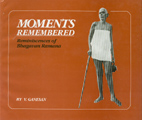
Moments Remembered
Compiled by V. Ganesan. A collection of interesting reminiscences gathered over many years by the author, who is the grandson of
Niranjanananda Swami,
the Maharshi's brother. Also included are many photographs of the Maharshi and of the disciples that were interviewed by the author. 9 x 7, Illustrated.
pp.134
Excerpts

My Life at Sri Ramanasramam
By
Suri Nagamma. More reminiscences from the author of
"Letters from Sri Ramanasramam", which includes many interesting autobiographical accounts of the author.
pp.150

My Recollections of Bhagavan Sri Ramana
By
A. Devaraja Mudaliar.
These are reminiscences told in a charming and unassuming style by the author of
Day by Day.
Such real life experiences, written by those who moved close with the Sage, breath life into the Maharshi's unique personality and teachings. These, and other reminiscences listed in this catalogue, are an invaluable asset to sincere seekers who wish to imbibe a deep spiritual experience.
pp.160
Extract

My Reminiscences
By
N. Balarama Reddy.
In 1993, two years before his passing, Balarama Reddy dictated these Reminiscences to a devotee. It is the inspired story of his early life and an inner quest which eventially brought him under the watchful eye of Sri Ramana Maharshi in the year 1937. The chapters of this book were first serialized in
'The Maharshi',
Arunachala Ashrama's bimonthly newsletter.
pp.121
read more

Ramana Smrti - Birth Centenary Souvenir
There are four fascinating parts to this book. The first contains insightful writings by many devotees who had personal contact with the Maharshi and received his Grace. The second provides thirteen intimate accounts of those fortunate souls - women devotees, in particular - who lived and served alongside the Master, receiving invaluable spiritual guidance and practical counsel for daily living. These memorable stories can be read repeatedly with enduring delight.
The third part consists of offerings by sincere devotees, many of whom had not met the Master physically, but had otherwise imbibed direct guidance and inspiration from him. They are a pointed reminder of how the power of the Master's personality continues to shine through those who turn to him with sincerity and faith.
The fourth and final part lays out a concise description of Tiruvannamalai, the great temple, the holy Arunachala Hill, the ancient festivals of the town,
Sri Ramanasramam
and its activities and other points of interest to all visitors to this holy place of pilgrimage. Although written by a prominent devotee over 30 years ago, the descriptions remain perfectly relevant today.
pp.227
Table of Contents

Sadhu's Reminiscences of Ramana Maharshi
By Sadhu Arunachala (Major A.W. Chadwick). Candid and engaging reminiscences of an unassuming English devotee who came to Sri Ramana Maharshi in 1935 and remained in Tiruvannamalai almost permanently until his passing in 1962.
pp.110
Some Verses

The Silent Power
Besides writings on Sri Maharshi, his beloved Arunachala and a few other interesting articles on various topics, this book, like
Fragrant Petals"
and
"Surpassing Love and Grace",
contains selections from
"The Mountain Path"
and
"The Call Divine".
pp.229
ToC, Excerpts

Sri Ramana Reminiscences
By G.V.Subbaramayya. This is a touching story told by a childlike devotee who looked upon his Master as his `All in All'. The account covers the years between 1933 and 1950 and clearly reveals Sri Bhagavan's love and concern for devotees struggling in the world.
pp.224
Excerpt

Surpassing Love and Grace
by His Devotees. These articles are taken from
The Mountain Path
and
The Call Divine.
Those devotees who were blessed enough to sit at His feet share their experiences with the reader. They speak of the Maharshi in awed tones and with overwhelming sensitivity and love. The reader is invited to participate in this spiritual feast.
pp.296
Ch.40, The Unfinished Game
Translations From the Writings
of Sri Ramana Maharshi
view these items in our
on-line bookstore

Collected Works of Ramana Maharshi - Sri Ramanasramam
Edited by
Arthur Osborne. A collection of English translations of all Sri Ramana Maharshi's Tamiḷ works, including both his original compositions and others which he translated from different languages. The editor adds a short note before each entry explaining its genesis. In this new 1996 edition certain texts translated by Arthur Osborne have been replaced by those of
Prof.K.Swaminathan, T.K.Jayaraman and Michael James. (New Indian Edition)
pp.319
Table of Contents

Five Hymns to Arunachala, and Other Poems
This is an English translation of the earliest of the Maharshi's poems. These poems, all written around 1914, were later collected and titled
Sri Arunachala Stuti Panchakam. They consist of devotional hymns sung in praise of Arunachala, with directions for attaining the Supreme State.
pp.180
Excerpt
![]()
Muruganar In His Own Words
Sri Mugavai Kanna Muruganar expressed his devotion by composing 30,000 exquisite Tamiḷ poems over a span of 50 years in praise of his Satguru, Bhagavan Sri Ramana Maharshi. These poems have been published under various titles including Sri Ramana Sannidhi Murai, Sri Ramana Jnana Bodham, Guru Vachaka Kovai etc., while some have been lost forever. Sri Muruganar took great care not to reveal many details about his own spiritual journey. However, he has left subtle clues buried in the depths of his brilliant poetry.
This book is a celebration of this beloved poet’s spiritual journey — his inspiration, his struggles, his singular love, his complete surrender, his meticulous documentation of his Guru’s teachings, and his supreme realization — all revealed through his own words from the epic collection of his verses. Though these verses were written in classical Tamiḷ, this book seeks to make them accessible to everyone including non-Tamiḷ readers. It also delves into Muruganar’s influences from ancient saint-poets, the socio-cultural context during his youth, and his friendships with literary figures and devotees. Most importantly, this work highlights Sri Muruganar’s unwavering single-pointed devotion and reverence for Bhagavan Sri Ramana Maharshi. We pray to Sri Bhagavan that devotees will benefit from reading this book and also understand the value of devotion and surrender.pp.550 see srmh.org, gururamana.org, ToC, excerpts,

Poems of Sri Ramana Maharshi
A versified English translation by Sadhu Arunachalai (Major A.W.Chadwick) of Sri Ramana Maharshi's philosophical poems and stray verses. These English translations were gone over word-by-word by the Maharshi and the translator writes, "He was very particular and not at all sympathetic to poetic license. The genesis of each poem is also given.
pp.48

Parayana, The Poetic Works of Bhagavan Sri Ramana Maharshi
The text of this volume contains the full repertoire of the
daily recitation at
Sri Ramanasramam. While it includes devotional hymns written by devotees about Sri Bhagavan, it principally consists of the original Tamiḷ poetry of the Master himself. Presented in legible Roman script with adjoining English translations, this compendium is sure to prove invaluable not only for non-Tamiḷs who want to chant Sri Ramana's verses but also for those who long to imbibe ever more deeply in the boundless wisdom they contain.
ISBN:81-8288-061-0
pp.301
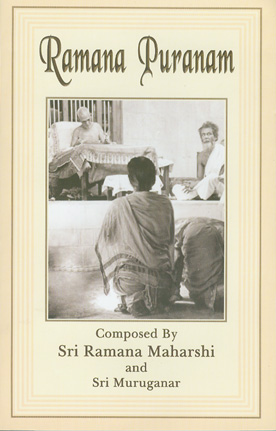
Ramana Purāṇam
In the 1920s and 30s Muruganar wrote Sri Ramana Sannidhi Murai, an anthology of devotional poems in praise of Sri Bhagavan that was modeled on the Tiruvācakam of Manikkavacakar
While he was composing in Sri Bhagavan's presence, he took a break to go out and think about the title. When he returned to the hall, he was astonished to discover that Bhagavan had not only named the poem Ramana Purāṇam by writing this title on every page of the manuscript, he had also completed it by composing and adding about 300 additional lines.
Mr.Robert Butler, Dr.T.V.Venkatasubramanian and Mr.David Godman deserve the grateful thanks of all fellow devotees for translating and annotating this important text. It is now available to devotees who know English.
pp.98
more

Revelation (Sri Ramana Hridayam)
A Sanskrit verse-rendering of Sri Ramana Maharshi's
Ulladu Narpadu (Forty Verses on Reality) and Anu-bandham (Supplement to the Forty Verses), with an English translation, authored by `Who' (K.Lakshmana Sarma), writer of Maha Yoga.
pp.101

Sri Arunachala Stuti Pancakam, Five Hymns in Praise of Sri Arunachala
This book, with commentary by Sadhu Natanananda, is the blessed outpouring from the sacred lips of Sri Ramana Maharshi with Sri Arunachala as the hero of the psalms.
see also
Tamiḷ Hymns CD,
Five Hymns,
Collected Works, ToC &
downloads
pp.112

Sri Ramana Gita
By
B.V.Narasimha Swami, the author of
Self-Realization. About the year 1930 while residing with the Master, the author, undertook a literary work - a recreation of
Kavyakantha Ganapati Muni's
Sri Ramana Gita in its original conversational, question-and-answer form. This enterprise was undertaken more than a dozen years after the conversations that comprise Sri Ramana Gita actually took place. With the help of the Maharshi and other devotees and with recourse to his own erudition,
B.V.N. was able to recreate thirteen of the eighteen chapters. These are presented in this book. They use simple language and are easy to understand.
pp.50
text

Truth Revealed (Sad-Vidya)
An English translation of Sri Ramana Maharshi's
Ulladu Narpadu and Anubandham, each consisting of forty verses. In these verses, composed, selected and arranged by the Maharshi, the Ultimate Truth and the path leading to It is revealed. The introduction is by
Grant Duff.
pp.33

Who Am I?
About 1902
Sivaprakasam Pillai put several questions to the Maharshi and, since the Sage was not then speaking, they were answered in writing. These answers constitute the first set of instructions written by the Maharshi and remain the quintessence of all the teachings he gave thereafter.
pp.15
![]()
![]() Table of Contents
Table of Contents

Words of Grace
Nan Yar? (Who am I?) and
Vichara Sangraham[1]
(Self-Enquiry) constitute the first set of instructions in the Maharshi's own words, written by him between 1900 and 1902. These two are the only prose compositions among Bhagavan's works. They clearly set forth the central teaching of
Self-Enquiry as the direct path to liberation.
Upadesa Manjari
(Spiritual Instruction)
is the reply to seventy questions put to the Maharshi by
Natananandar. Words of Grace is a valuable English translation of these three works.
pp.68
![]()
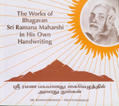
Works of Bhagavan Sri Ramana Maharshi in His own Handwriting
Published by Sri Ramana Kshetra. Contains reproductions of all of the Maharshi's compositions written in his own handwriting. The last fifty-nine pages provides us with accurate translations of these works.
pp.165
Appalam Song
[1]
Vichara Sangraham is Ch.26 of
Kunju Swami's
Reminiscences
It is the Q&A version of
Self-Enquiry





